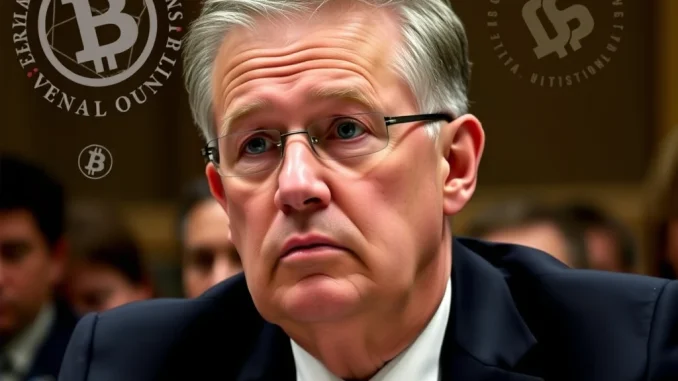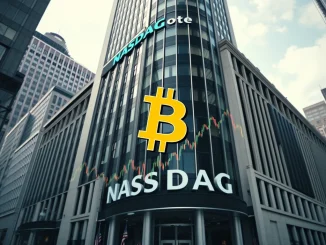
The crypto world is watching closely as the nomination of Paul Atkins to the U.S. Securities and Exchange Commission (SEC) chair faces intense scrutiny. Why? Because of his prior ties to the now-infamous FTX exchange. Senator Elizabeth Warren is leading the charge, raising serious questions about potential conflict of interest and casting a shadow over Atkins’ suitability to lead the SEC. Let’s dive into the details of this developing story and understand what it means for the future of cryptocurrency regulation.
SEC Nominee Paul Atkins Grilled on FTX Advisory Role
During a recent U.S. Senate hearing, the spotlight was firmly on SEC nominee Paul Atkins. The central issue? His consulting firm, Patomak Global Partners, and its past advisory work for FTX. According to Cointelegraph reports, Atkins found himself in a tight spot, declining to disclose potential buyers for his firm amidst growing concerns about transparency and ethical considerations.
Here’s a quick rundown of the key points from the hearing:
- Senator Warren’s Interrogation: Senator Elizabeth Warren didn’t hold back, directly questioning Atkins about Patomak Global Partners’ involvement with FTX.
- Disclosure Refusal: Atkins reportedly declined to name potential buyers for his firm, citing confidentiality. This lack of transparency is fueling suspicion and concern.
- Conflict of Interest Allegations: Warren specifically raised the specter of a conflict of interest, given Atkins’ nomination to chair the SEC, the very agency that regulates the cryptocurrency space, including potentially investigating the fallout from FTX.
- 2008 Financial Crisis Criticism: Warren also brought up Atkins’ track record during the 2008 financial crisis, accusing him of demonstrating poor judgment – a serious charge for someone vying to lead a critical regulatory body.
- “Preemptive Bribe” Warning: Perhaps the most explosive accusation was Warren’s warning that the sale of Patomak Global Partners, without disclosing the buyers, could be perceived as a “preemptive bribe.” This strongly suggests concerns about undue influence and hidden agendas.
Why is the FTX Connection a Red Flag for the SEC Nominee?
The FTX collapse sent shockwaves through the crypto industry, exposing massive mismanagement and alleged fraud. The fact that Paul Atkins’ firm previously advised FTX is now a major point of contention. Critics argue that this connection raises several critical questions:
- Regulatory Blind Spot?: Did Atkins’ firm, while advising FTX, identify any red flags? If so, were these flags properly addressed or ignored?
- Impartiality Concerns: Can Atkins, with his firm’s past FTX relationship, objectively oversee and regulate the cryptocurrency industry, especially given the ongoing investigations and potential enforcement actions related to FTX?
- Appearance of Impropriety: Even if no actual wrongdoing occurred, the appearance of a potential conflict of interest can erode public trust in the SEC and its regulatory decisions.
The timing of the potential firm sale also adds fuel to the fire. Senator Warren’s “preemptive bribe” comment highlights the concern that undisclosed buyers might be seeking to gain influence over the SEC through this transaction, particularly with Atkins potentially at the helm.
Senator Warren’s Scathing Critique: A Deep Dive
Senator Elizabeth Warren has emerged as a vocal critic of Paul Atkins’ nomination. Her concerns go beyond just the FTX connection. She has painted a picture of Atkins as someone with a history of regulatory missteps and a potentially pro-industry bias that could weaken the SEC’s ability to protect investors. Let’s break down Warren’s key criticisms:
| Criticism Point | Details |
| 2008 Financial Crisis Record | Warren argues Atkins demonstrated poor judgment during the 2008 crisis, suggesting he may not have the necessary foresight to prevent future financial meltdowns in the crypto space or wider markets. |
| FTX Advisory Role | The direct link to FTX, a company now synonymous with crypto industry failures, is a major black mark on Atkins’ record in Warren’s view. |
| Lack of Transparency on Firm Sale | Atkins’ refusal to disclose potential buyers of Patomak Global Partners raises serious questions about hidden agendas and potential undue influence, according to Warren. |
| Pro-Industry Stance (Implied) | While not explicitly stated in the provided content, Warren’s general stance suggests a concern that Atkins might be too lenient towards the financial industry, potentially at the expense of investor protection and robust cryptocurrency regulation. |
What Does This Mean for Cryptocurrency Regulation Moving Forward?
The controversy surrounding Paul Atkins’ nomination comes at a crucial time for cryptocurrency regulation in the United States. The FTX debacle has amplified calls for stronger oversight of the digital asset space. The outcome of Atkins’ nomination process could significantly impact the direction of crypto regulation for years to come.
Here’s what’s at stake:
- SEC’s Regulatory Approach: If Atkins is confirmed, will the SEC take a more lenient or stricter approach to crypto regulation? His past industry ties and the current controversy suggest a potential for a less aggressive stance, which worries some investor protection advocates.
- Trust in Regulatory Bodies: The handling of Atkins’ nomination and the transparency surrounding his firm’s sale will either bolster or erode public trust in the SEC’s ability to impartially regulate the complex and rapidly evolving crypto market.
- Future of Crypto Innovation: The level and type of regulation will significantly shape the future of cryptocurrency innovation in the U.S. Too lax regulation could lead to more FTX-style collapses, while overly strict rules could stifle innovation and drive crypto businesses overseas.
Conclusion: A Test for Crypto Regulation and SEC Integrity
The nomination of Paul Atkins is proving to be a major test for both the future of cryptocurrency regulation and the perceived integrity of the SEC. Senator Warren’s forceful questioning and the unresolved questions surrounding Patomak Global Partners’ sale have created a cloud of uncertainty. The crypto community and concerned citizens alike are waiting to see how this situation unfolds. Will transparency prevail? Will concerns about potential conflict of interest be adequately addressed? The answers to these questions will have profound implications for the regulatory landscape of the digital asset world and the public’s faith in the institutions designed to protect them.



